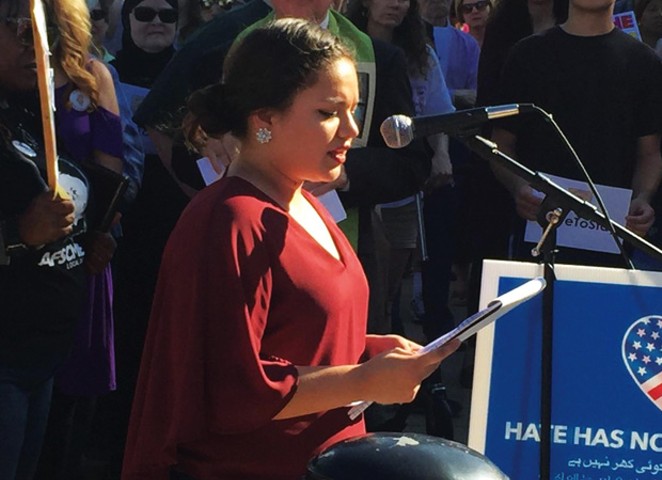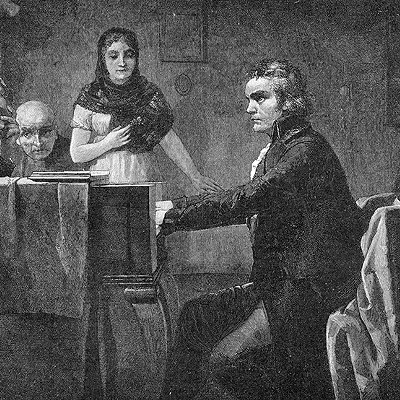Pro-DACA rally recalls Springfield’s immigrant history
[
{
"name": "Air - MedRect Combo - Inline Content 1",
"component": "11490391",
"insertPoint": "3",
"requiredCountToDisplay": "1",
"parentWrapperClass": "fdn-ads-inline-content-block"
},{
"name": "Air - MedRect Combo - Inline Content 2",
"component": "11490392",
"insertPoint": "7",
"requiredCountToDisplay": "5",
"parentWrapperClass": "fdn-ads-inline-content-block"
},{
"name": "Air - MedRect Combo - Inline Content 3",
"component": "11490393",
"insertPoint": "12",
"requiredCountToDisplay": "9",
"parentWrapperClass": "fdn-ads-inline-content-block"
}
]
The Trump administration’s Sept. 5 announcement rescinding the U.S. government’s Deferred Action for Childhood Arrivals (DACA) policy, which provided protections for illegal immigrants who were brought to the U.S. as children, resulted in protests across the country last week, including one on the steps of the State Capitol on Sunday, Sept. 10.
As several speakers took turns at the microphone – including one area student who stands to be affected by the decision – a common theme emerged of Springfield’s long history of welcoming immigrant labor. The Trump administration says the recision will not be for six months in order for Congress to find an alternative.
Sister Marcelline Koch, of Springfield’s Dominican Sisters, read a statement which in part pointed out that in 1873, when the sisters first came to Jacksonville, it was to teach immigrant children of Irish railroad workers. Sister Elyse Ramirez, also of the Dominican Sisters, made things more personal, speaking about her grandfather who was undocumented until serving in the U.S. army during World War I, after which he was granted citizenship. She also spoke of railroad workers from all backgrounds living in Springfield, who “spoke each other’s language, wet-nursed each other’s babies…that’s what our country is, not what we want it to be.”
“The misunderstanding is always the same when it comes to immigrants and even refugees,” said UIS instructor Veronica Espina, who also chairs the Springfield Welcoming City committee. “The contexts and circumstances in which those parents were forced to leave were not easy ones.” Espina spoke in detail about Springfield history, beginning with an 1850 wave of Portuguese immigrants who settled here to escape religious harassment at home, to the Irish immigrants that worked on the railroad, to the end of the 19th century when English, Irish, Scottish, Welsh and German miners settled in Springfield to work in the coal mines. By 1899, she said, 25 percent of the workers in Springfield mines hailed from France, Belgium, Austria, Hungary, Russia and Italy – with Italians making up the largest single group of miners. “We are and always have been a city of immigrants,” she said.
Rev. Martin Woulfe of the Abraham Lincoln Unitarian Universalist Congregation spoke of his European immigrant ancestors. “My great-grandparents fled Europe…and were driven to these shores,” he said. “By the language of today, they were undocumented – the only paper they had was a ticket on a steerage steamer – they did not have visas or government clearance. Today, we can either reach out and welcome these people as brothers and sisters or we can shove them away.”
Representing the “Dreamers” (so-called because of the Dream Act, a piece of bipartisan legislation introduced in 2001 by Sen. Dick Durbin, D-Illinois, and Sen. Orrin Hatch, R-Utah, which would provide permanent protection for undocumented immigrants brought into the country as children was 19-year-old Lisset, [last name withheld, out of fear for the safety of herself and her family], an Illinois College student who was brought to the U.S. at age three. “When President Obama signed the executive order for DACA,” she said, “things got a little brighter for a lot of us. It gave me an identity.” Lisset said after DACA she was able to purchase a vehicle, obtain a driver’s license and get a job.
Lisset described a youth spent volunteering in nursing homes and planning blood drives in Beardstown. She was president of her high school’s National Honor Society, art club vice president and student council treasurer –“all while maintaining a 4.0 GPA and working as a waitress at a Mexican restaurant.” She is currently finishing her bachelor’s degree at Illinois College, and hopes to attend medical school. “I pay taxes, I contribute to the economy and to my community – my only crime has been to want a future for myself and for America.” She pointed out that DACA only provides a Social Security number and work permit to eligible recipients, who cannot receive food stamps, medical insurance or benefits and who must pay taxes and cannot have any sort of criminal record.
“I am in no way a politician, but I do believe that President Trump approached this in a cruel way,” Lisset said. “I have a message for President Trump, Congress and for all of those who see us as criminals – I am American. All 800,000 of us are Americans. We will not leave, we will stay and fight with every ounce of energy in us.”
Contact Scott Faingold at [email protected].
As several speakers took turns at the microphone – including one area student who stands to be affected by the decision – a common theme emerged of Springfield’s long history of welcoming immigrant labor. The Trump administration says the recision will not be for six months in order for Congress to find an alternative.
Sister Marcelline Koch, of Springfield’s Dominican Sisters, read a statement which in part pointed out that in 1873, when the sisters first came to Jacksonville, it was to teach immigrant children of Irish railroad workers. Sister Elyse Ramirez, also of the Dominican Sisters, made things more personal, speaking about her grandfather who was undocumented until serving in the U.S. army during World War I, after which he was granted citizenship. She also spoke of railroad workers from all backgrounds living in Springfield, who “spoke each other’s language, wet-nursed each other’s babies…that’s what our country is, not what we want it to be.”
“The misunderstanding is always the same when it comes to immigrants and even refugees,” said UIS instructor Veronica Espina, who also chairs the Springfield Welcoming City committee. “The contexts and circumstances in which those parents were forced to leave were not easy ones.” Espina spoke in detail about Springfield history, beginning with an 1850 wave of Portuguese immigrants who settled here to escape religious harassment at home, to the Irish immigrants that worked on the railroad, to the end of the 19th century when English, Irish, Scottish, Welsh and German miners settled in Springfield to work in the coal mines. By 1899, she said, 25 percent of the workers in Springfield mines hailed from France, Belgium, Austria, Hungary, Russia and Italy – with Italians making up the largest single group of miners. “We are and always have been a city of immigrants,” she said.
Rev. Martin Woulfe of the Abraham Lincoln Unitarian Universalist Congregation spoke of his European immigrant ancestors. “My great-grandparents fled Europe…and were driven to these shores,” he said. “By the language of today, they were undocumented – the only paper they had was a ticket on a steerage steamer – they did not have visas or government clearance. Today, we can either reach out and welcome these people as brothers and sisters or we can shove them away.”
Representing the “Dreamers” (so-called because of the Dream Act, a piece of bipartisan legislation introduced in 2001 by Sen. Dick Durbin, D-Illinois, and Sen. Orrin Hatch, R-Utah, which would provide permanent protection for undocumented immigrants brought into the country as children was 19-year-old Lisset, [last name withheld, out of fear for the safety of herself and her family], an Illinois College student who was brought to the U.S. at age three. “When President Obama signed the executive order for DACA,” she said, “things got a little brighter for a lot of us. It gave me an identity.” Lisset said after DACA she was able to purchase a vehicle, obtain a driver’s license and get a job.
Lisset described a youth spent volunteering in nursing homes and planning blood drives in Beardstown. She was president of her high school’s National Honor Society, art club vice president and student council treasurer –“all while maintaining a 4.0 GPA and working as a waitress at a Mexican restaurant.” She is currently finishing her bachelor’s degree at Illinois College, and hopes to attend medical school. “I pay taxes, I contribute to the economy and to my community – my only crime has been to want a future for myself and for America.” She pointed out that DACA only provides a Social Security number and work permit to eligible recipients, who cannot receive food stamps, medical insurance or benefits and who must pay taxes and cannot have any sort of criminal record.
“I am in no way a politician, but I do believe that President Trump approached this in a cruel way,” Lisset said. “I have a message for President Trump, Congress and for all of those who see us as criminals – I am American. All 800,000 of us are Americans. We will not leave, we will stay and fight with every ounce of energy in us.”
Contact Scott Faingold at [email protected].
Illinois Times has provided readers with independent journalism for almost 50 years, from news and politics to arts and culture.
Your support will help cover the costs of editorial content published each week. Without local news organizations, we would be less informed about the issues that affect our community..
Got something to say?
Send a letter to the editor and we'll publish your feedback in print!






















